EU Nature legislation Fit for Purpose
Zierzsee © Barbara Lüthi-Herrmann
The announcement that EU nature directives are fit for purpose, asserts the hard work of EUROPARC members in the management of Natura 2000 sites.
The positive conclusion of this long process is a great news today for nature and EU citizens
said yesterday Ignace Schops, EUROPARC President “It is the recognition of the tremendous work that Natura 2000 site managers and protected areas authorities are daily doing on the ground. With our wide network, we will now actively support the European Commission to develop this Action Plan and contribute to ensure a better implementation of the Directives.”
EUROPARC welcomes the results of the Fitness Check process, which indeed assessed that the Birds and the Habitats Directives are fit for purpose and are crucial for the future of biodiversity in Europe. The effectiveness, efficiency, coherence and relevance of the Directives have now been recognised.
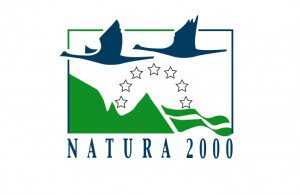
Nevertheless, this evaluation process, carried by the European Commission over the last two years, identified the need to improve the implementation of the Directives and their coherence with broader socio-economic objectives, including other EU policy areas such as energy, agriculture and fisheries.
“The focus will now be on making sure that they are implemented in the most effective and efficient way to realise their full potential for nature, people and the economy”, said yesterday Karmenu Vella, the European Commissioner for the Environment and Maritime affairs.
The Commission will now develop an Action Plan, which will contain a series of concrete measures and appropriate implementation guidelines.
For further information:
Access here the Fitness Check report
The EUROPARC position on EU Nature legislation
More on the Fitness Check process
The Tangier declaration: the role of Mediterranean Marine Protected Areas in climate change mitigation and adaptation
Cinque Terre National Park, Italy
The 2nd Forum of Marine Protected Areas in the Mediterranean was organised last week by MedPAN (the network of Marine Protected Areas in the Mediterranean), RAC/SPA and the “Haut Commissariat aux Eaux et Forêts et la lutte contre la desertification du Royaume du Marroc”. The Forum created the Tangier Declaration, setting up recommendations for the Mediterranean Sea in order to reach the international objective of 10% Mediterranean surface covered by a protection status, as stated in the Convention of Biological Diversity (CBD).

“Marine Protected Areas are everyone’s business!”
Over 300 key players involved in the marine environment gathered in Tangier, Morocco, from the 28th November to 1st December. The final output of the Forum was the creation of the Tangier declaration that will be used to update the 2020 MPA Roadmap elaborated at the 2012 MPA Forum in Antalya. This Roadmap aims to support the achievement of the international objective set by the Convention on Biological Diversity to protect 10% of the Mediterranean Sea through an effective network of MPAs by 2020.
The Roadmap will be updated with the most recent institutional framework and a new strategic objective related to the role of MPAs as a marine spatial management tool in supporting ecosystem-based adaptation and mitigation to climate change. Key operational and action-oriented steps will also be considered, to improve and help achieve the Roadmap objectives by 2020.
During the Forum, participants reviewed the MPA progress achieved in the last 4 years, discussed the remaining challenges to 2020, considered recent global, regional and sub-regional marine policy developments regarding the ecosystem approach, sustainable development and climate change issues, and considered the recommendations from the different sessions of the Forum.
Download the Tangier Declaration.
Integrating N2000 objectives in MPA management
 EUROPARC coordinated a Focus session on Integrating N2000 objectives in MPA management, where recommendations to be integrated in the Tangier Declaration were made.
EUROPARC coordinated a Focus session on Integrating N2000 objectives in MPA management, where recommendations to be integrated in the Tangier Declaration were made.
Today, the Natura 2000 network covers 4,9% of the EU Mediterranean waters and it represents the biggest share of current MPAs, largely overlapping with other MPA designations in EU waters (national designations/Barcelona convention). This means, that many of MPAs in the Mediterranean have to implement the legal obligations stemming from the EU nature directives.
Teresa Pastor and Laurent Fourbès, vice-president of MedPAN, moderated the session, which gathered around 30 people. Fotios Papoulias, from EC DG ENV, introduced the Natura 2000 management framework and Bruno Meola, from MedPAN, presented a regional overview of marine Natura 2000 sites in the Mediterranean.
The practical aspect of the session came from two case-studies:
- The management of Agathoise Coast MPA and Natura 2000 using the DOCOB (Document d’Objectifs) instrument by Renaud Dupuy de la Grandrive – Manager Director of the Marine Environment, Ville d’Agde , France
- Challenges towards the creation and management of a new MPA around the Gyaros Natura 2000 site. (CYCLADES LIFE Project, Greece) by Ioli Christopoulou – Nature Policy Officer, WWF Greece
The session concluded with the following recommendations that would be integrated as an Annexe of the Tangier Declaration.
| 1) The network of people working in MPA may support the EC and countries in strengthening the effective management of marine Natura 2000 sites, namely through capacity-building of Mediterranean marine Natura 2000 managers, thus better integrating with the Natura 2000 biogeographical Process approach. |
| 2) Encourage Member States to allocate the necessary human resources to afford the adequate in situ management to designated marine Natura 2000 sites. |
| 3) Beyond the boundaries of the network of marine Natura 2000, establish mechanisms in cooperation with and in support of non EU countries in order to warranty the conservation of key functional areas, namely for highly mobile species, in order to reach coherence of the Mediterranean Marine Protected Areas network. |
During the Forum, SPA/RAC introduced the short film “EcAp for the Mediterranean”, which aims at raising awareness on the urgent protecting of the Mediterranean and introduces the Ecosystem Approach, developed in the framework of the EcAp-Med II Project.
For more information about Marine issues, please contact Stefania Petrosillo – s.petrosillo @ europarc.org.
19 Sustainable Destinations awarded in Brussels – Charter Award Ceremony 2016
Charter Award Ceremony 2016
Photos of the Award Ceremony at the European Parliament here
Photos of the Side event at the Delegation of the Government of Catalonia to the EU here.
Downloand the presentations below.
On the 7th December 2016, 19 Sustainable Destinations were awarded the European Charter for Sustainable Tourism in Protected Areas. Among them, 11 have committed for the first time to the principles of the Charter and 8 have renewed their commitment. The Charter Network, which has been growing over the past 20 years, counts now 157 Sustainable Destinations in 19 European countries.
To celebrate the work of Protected Areas and their engagement in sustainable tourism management, EUROPARC Federation with the kind support of MEP Ramon Tremosa i Balcells who hosted the event in the European Parliament, organised the Charter Award Ceremony for the year 2016.
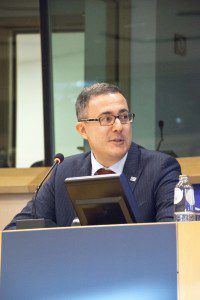
Nicola Notaro, Head of the Nature Unit, DG Environment – European Commission
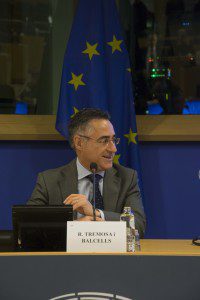
MEP Ramon Tremosa i Balcells
During the ceremony, the benefits that sustainable tourism strategies provide for people, environment and local economy within Protected Areas were highlighted by MEP Ramon Tremosa i Balcells and Nicola Notaro – Head of the Nature Unit, DG Environment – European Commission.
The EUROPARC Federation was delighted to welcome for the first time two Parks from Greece and award the first Transboundary Region – the Julian Alps Ecoregion, that encompasses Triglav National Park in Slovenia and Prealpi Giulie Nature Park in Italy.
Stefano Santi, Director of Prealpi Giulie Nature Park (Italy) acknowledged, “the Charter is a flagship for the whole Transboundary Region. It expresses a genuine European spirit of respect for nature and brotherhood among people of different countries and represents an extraordinary chance to promote the breath-taking world of the Julian Alps and its unique biodiversity and cultural heritage”.
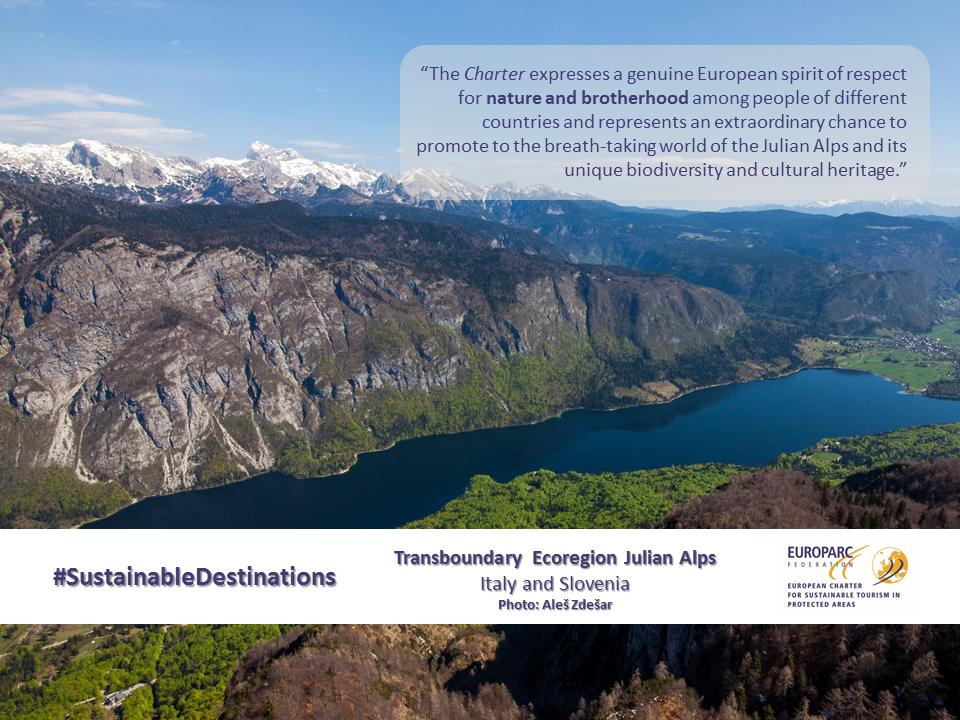
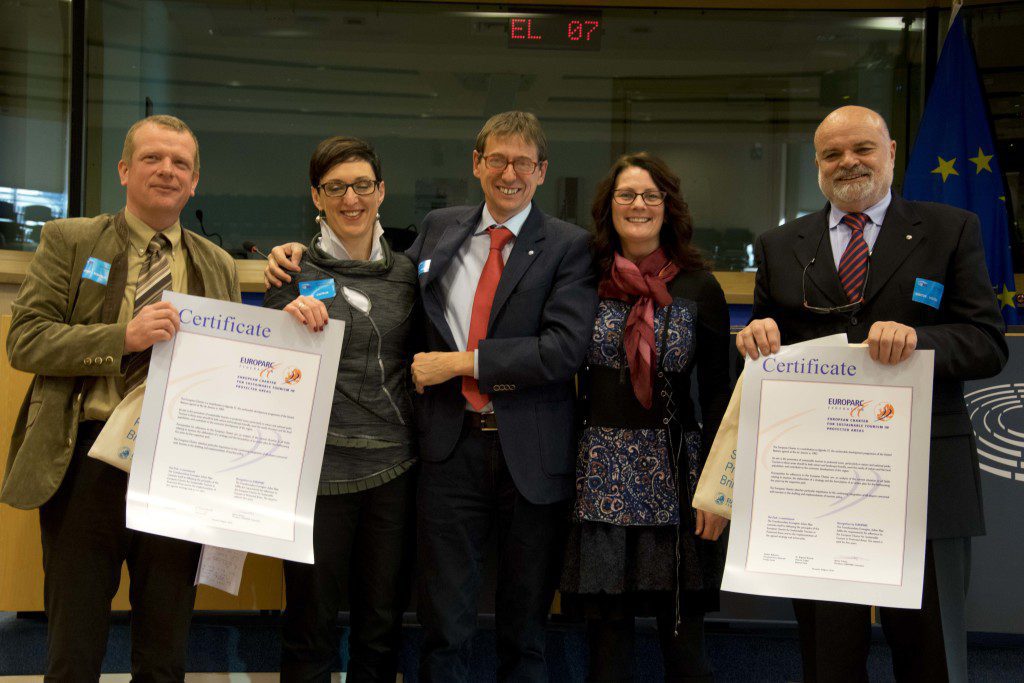
Transboundary Ecoregion Julian Alps being awarded at the Charter Award Ceremony 2016
Developing sustainable tourism in partnership
The European Charter for Sustainable Tourism in Protected Areas is a practical management tool that enables Protected Areas to develop tourism sustainably, by working together with all local relevant stakeholders. The core element of the Charter is partnerships established to develop a common sustainable tourism strategy and action plan for the territory, over a period of five years.
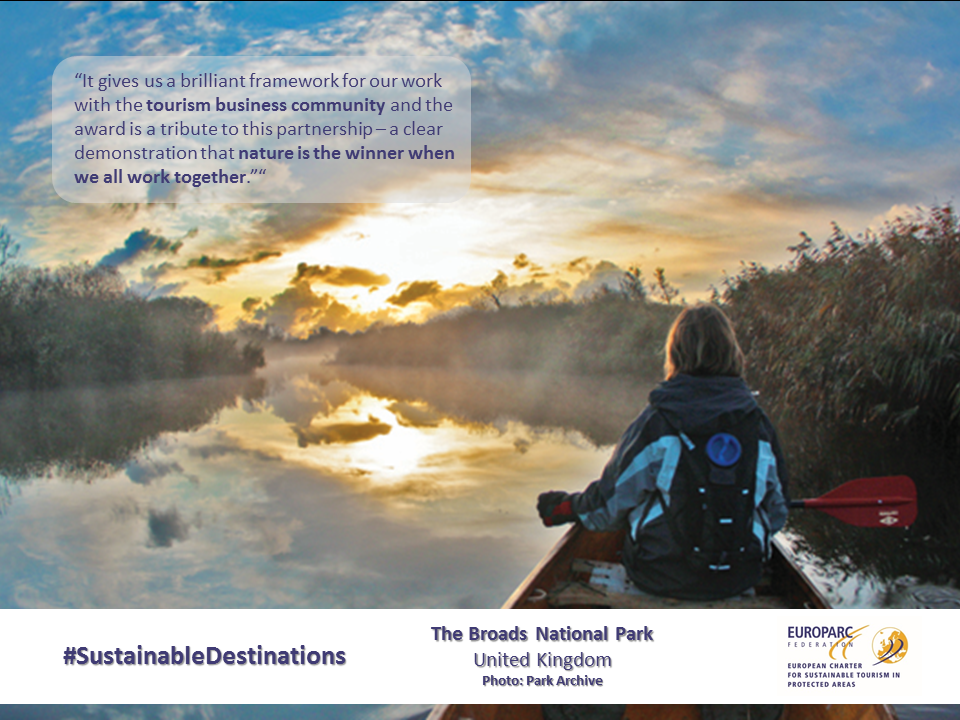
The Broads National Park (United Kingdom), who was awarded for the 3rd time, recognises that “the Charter gives us a brilliant framework for our work with the tourism business community and the award is a tribute to this partnership – a clear demonstration that nature is the winner when we all work together.”
Working actively with local businesses and tour operators will be the next step for the Sustainable Destinations awarded today.
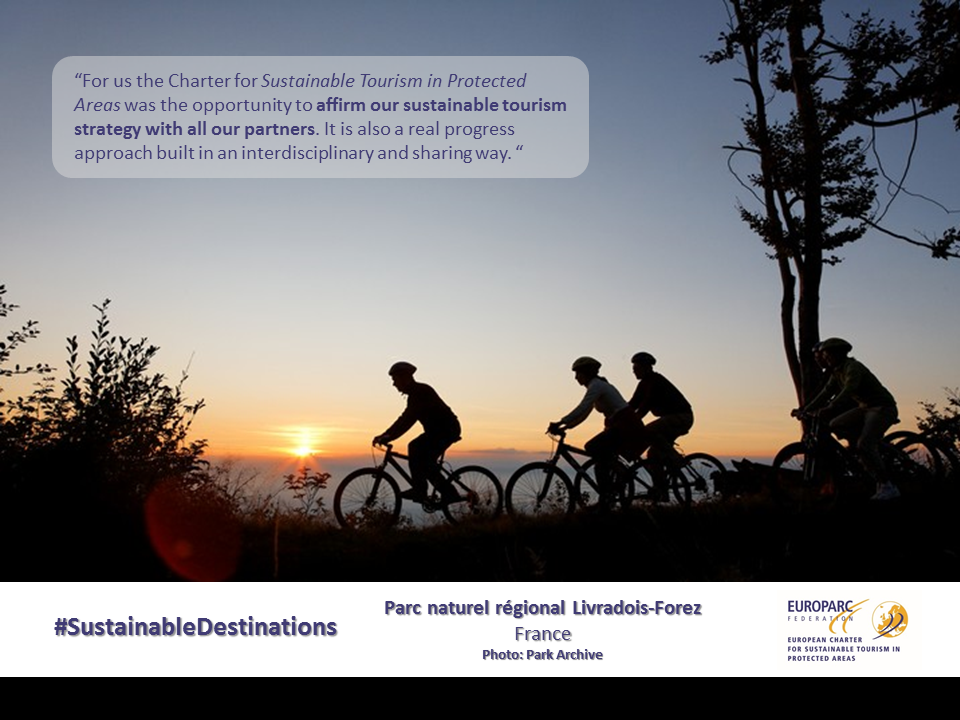
Parks awarded today
Parks awarded for the 1st time
Greece
1. National Park of Tzoumerka, Peristeri and Arachthos Gorge
2. Chelmos Vouraikos National Park & Unesco Global Geopark
Italy
1. Parco Nazionale Arcipelago Toscano
2. Parco Nazionale del Cilento Vallo di Diano ed Alburni
3. Ente di Gestione delle Aree Protette del Monviso
4. Area Marina Protetta e Riserva Naturale dello Stato di Torre Guaceto
5. Riserva Naturale Statale Gola del Furlo
Italy/Slovenia
1. Transboundary Ecoregion Julian Alps (Prealpi Giulie NP/ Triglav NP)
Portugal
Spain
1. Parc Natural del Montgrí, les Illes Medes i el Baix Ter
Parks re-awarded
France
1. Parc naturel régional des Alpilles
2. Syndicat mixte du Parc naturel régional Livradois-Forez
3. Parc naturel régional du Vercors
Spain
1. Parque Nacional de Cabañeros
3. Parque Natural de Sant Llorenç del Munt i L’Obac
4. Parc Natural de la Zona Volcànica de la Garrotxa
United Kingdom
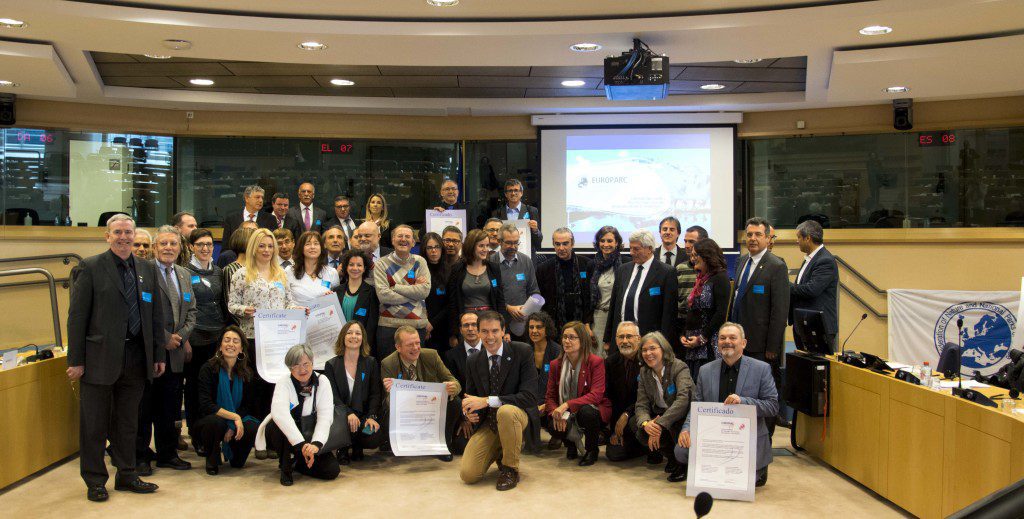
Charter Award Ceremony 2016, check the photo album here
Side-event
Following the Charter Award Ceremony at the European Parliament, the Delegation of the Government of Catalonia to the EU welcomed all the participants and speakers for a special side event. The event focused on how the Catalonia region has been embracing the Charter for over 20 years and using it as a tool that brings nature and social benefits.
The Ceremony was officially open with a promotional film about the Catalonia Region:
In a region where 33% of land is protected, the Charter has been a valuable tool to bring together the main actors on the field on Nature and Tourism. Indeed, Catalonia has been very successful engaging all institutions in the development of their Sustainable Destinations – from government authorities to tourism organisations and Parks. During the event, representatives from the Government of Catalonia, the Catalan Tourist Board, the Diputació de Girona and the Costa Brava Girona Tourism Board shared their perspectives and spoke about their engagement with Sustainable Tourism.

Josep Maria Prats, who was one of the main promoters of the Charter in Catalonia, especially in the La Garrocha Volcanic Zone Natural Park, made a presentation about “Tourism in natural parks accredited with the European Charter for Sustainable Tourism in Protected Areas and the relationship with tourist organisations – the case study from the Zona Volcanica de la Garrotxa Nature Park.”
For more information please contact the EUROPARC Federation to info @ europeancharter.org.